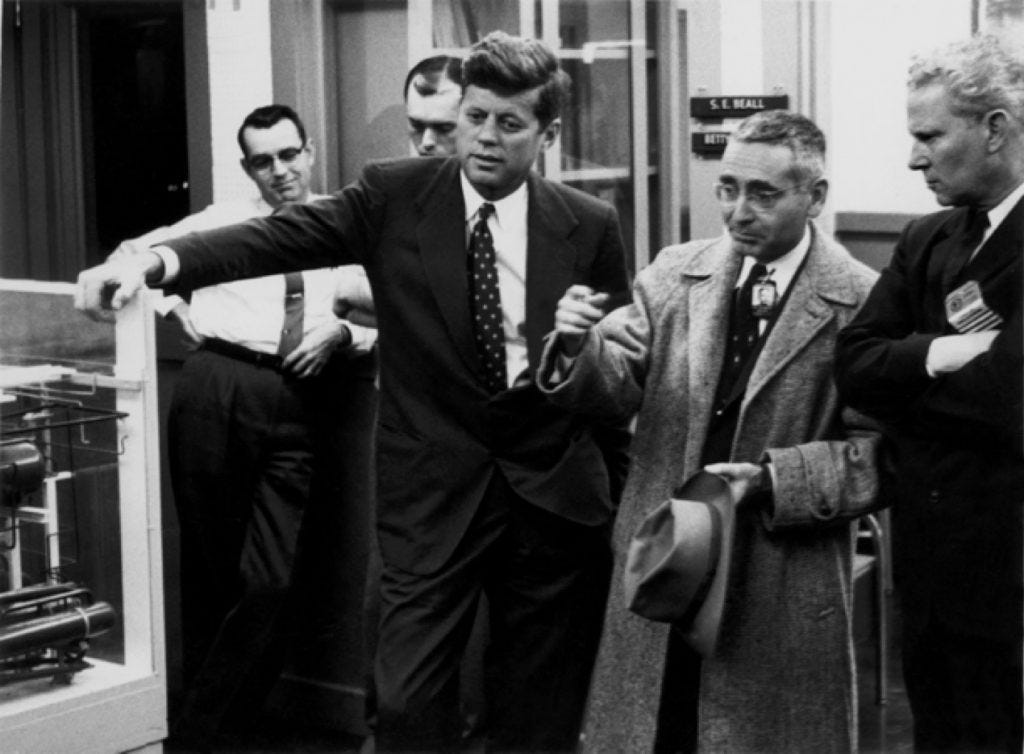GK News Choir Rules
Figure 1. JFK, Al Gore Senior checking out model of molten salt reactor.
Nuclear power in the US has become politicized. Polls indicate a 20% spread between Republicans and Democrats on support for nuclear power. This has been the case for 40 years.
Figure 2. Gallup nuclear power poll, 2002-2022.
But it was not always this way. The original push for nuclear came from big government liberals, including Scoop Jackson, Albert Gore Sr, and Stuart Symington. And when skeptical, conservative utility managers were slow to get with the program, Jackson, Gore et al were quite prepared to let them know the alternative was publicly owned nuclear power. Support for nuclear power was Plank Number 1 in JFK's 1960 Democratic party platform. The Democratic Party was instrumental in the early development of nuclear power in the United States.
However, the Left Wing of the party was strongly and vocally anti the Bomb and in particular nuclear weapons testing. After the test ban in 1963, the Far Left's focus shifted to the Vietnam War. This cause expanded the movement quite a bit, producing a counter-culture which was prepared to question just about everything, including the basic social structure. When the Vietnam War ended, the movement was out of targets.
The best they could come up with was nuclear power. Nuclear power could easily be conflated with nuclear weapons. They both produce radiation. The yellow and black trefoil posters could be reused. Far more importantly, nuclear power was an excellent symbol of the dangerous, high tech, centralized social structure that brought us the Bomb and created the mess the world was in. Nuclear power represented The Man.
And nuclear power was a great way of keeping the party going. In 1979, after Three Mile Island, an anti-nuclear power rally was held in DC. 75,000 people showed up including Ralph Nader, Tom Hayden, Jane Fonda, and other luminaries of the anti-Vietnam protests. "What a fantastic day!", enthused Hayden; "It reminds me of the best days of the 60's".
By the time the movement had switched focus to nuclear power, ALARA based regulation has already made nuclear uneconomic in the USA. That same regulatory system guarantees that nuclear's costs cannot recover regardless of the level of political support. The anti-nuke movement's role in suppressing nuclear power in the USA has been vastly exaggerated.
Nonetheless the attitudes created during the Cold War are with us to this day. They have created the political reflexes that still show up in the polls. It is a split that makes no sense. Nuclear power is just another source of electricity. It should be judged on its metrics, Figure 3, not on how it fits into someone's political world view.
Figure 3. Nuclear Metrics. Conveniently missing is Cost.
The Gordian Knot News is determined not to contribute to this nonsense. Any comment on this substack that has the slightest tinge of partisan politics, however cleverly tied to the subject at hand, will be expunged. There will be no more warnings. Repeat offenders will be cast from the choir.





I couldn't agree with you more. But at the risk of being cast out, so long as we are not living under a totalitarian dictatorship, politics will always be part of this discussion because it is the only way we can decide what rules we are going to live by without killing each other. I can't stand either political party at this point, but that does not mean we should abandon politics. Political persuasion is the only way to better our world, something I think you know, or you wouldn't be doing this newsletter.
Two things. Firstly, the nuclear movement needs to walk away from the USA. Building reactors in factories in France, Korea and Taiwan, for example, removes a substantial amount of the political goo that's holding up the adoption of nuclear for the third world. The NRC doesn't deserve to have any status in the future of this technology. Secondly, modular designs can be more readily serviced in the third world - the molten salt reactors that Kirk and Jack are describing are no more complicated than a Toyota Land Cruiser and they're delivered and driven and serviced virtually everywhere in Africa and Asia. Something goes wrong? The unit shuts down and the factory sends a replacement module.